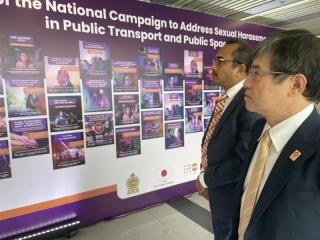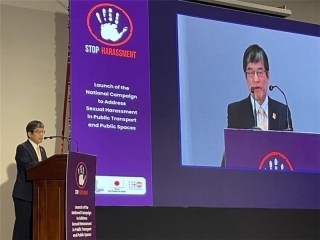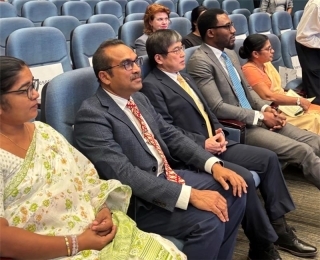Sri Lanka Launches National Campaign to End Sexual Harassment in Public Transport (SHPT) and Public Spaces - Joint initiative by the Government of Sri Lanka, the Government of Japan and UNFPA, to ensure safer, harassment-free travel for all in Sri Lanka
2025/7/23

A national campaign aimed at tackling sexual harassment in public transport and public spaces was launched today (July 23) at the Suhurupaya Auditorium in Battaramulla. The campaign, jointly launched in partnership with the Ministry of Women and Child Affairs and the Ministry of Transport, Highways, Ports and Civil Aviation, and technically supported by UNFPA Sri Lanka with funding from the Government of Japan, seeks to create safer, gender-sensitive public spaces and ensure dignity and safety for all commuters, especially, women and girls.
Sexual harassment in public transport is a widespread challenge in Sri Lanka, disproportionately affecting women and girls, and hindering their access to education, employment, and public life. The campaign supports Sri Lanka’s National Action Plan (2024–2028) to Address Sexual and Gender-Based Violence (SGBV) and aligns with the Government’s CLEAN Sri Lanka initiative to make public transport safe, modern, and inclusive.

The campaign will feature a series of short videos encouraging bystander action, posters, leaflets and pocket cards displaying reporting hotlines, digital messages in key locations, and a robust social media outreach and announcements from transport sector authorities to ensure harassment free public transport. The below key helplines will be prominently displayed on all campaign materials to encourage reporting and access to services:
- Women’s Helpline (1938)
- Police Children and Women Bureau (109)

Hon. Saroja Savithri Paulraj, Minister of Women and Child Affairs, added, “Gender-based violence in public spaces is not only a safety concern. It is a human rights issue. Sexual harassment on buses, trains, and at terminals restricts freedom of movement and undermines women's access to education, livelihoods, and public life. It is our responsibility to ensure safety for all, especially women and girls. This campaign is a milestone in ensuring every woman and girl can live, move, and thrive without fear. I thank UNFPA for its longstanding support and technical leadership on addressing GBV in Sri Lanka.”
Mr. Kunle Adeniyi, UNFPA Representative in Sri Lanka, emphasized UNFPA’s long-standing support, adding that “Sexual harassment in public transport is a silent epidemic, often normalized, often ignored, but deeply damaging. In 2015, UNFPA’s national study revealed that 90% of women surveyed had experienced sexual harassment in public transport at least once, yet only 4% sought help. These numbers are not just statistics, they represent real people, real journeys, and real harm. Every girl has the right to go to school without fear. Every woman has the right to work and move freely. UNFPA remains committed to working alongside the Government, the Embassy of Japan, and our partners to make public transport safe for all, and to make safety everyone’s responsibility.”

H.E. Akio ISOMATA, Ambassador of Japan to Sri Lanka, commenting on the significance of the ongoing project and the launching of the national campaign, said " Preventing and addressing sexual harassment in public transport and, thereby creating a safe environment for women, is essential in mobilizing female labor force in the economy and crucial in promoting women's participation in the society. Awareness-raising for not tolerating sexual harassment is a very important step as it serves as a clear warning to potential perpetrators, sharing knowledge with victims on how to deal with the situations, as well as encouraging bystanders to take action to help the victims. I sincerely hope that, utilizing the resources provided by the project, the Government of Sri Lanka will strengthen the awareness-raising campaigns throughout the island in collaboration with local governments and other stakeholders."
The launch featured an interactive exhibition showcasing campaign materials, survivor stories, and information booths on reporting mechanisms and bystander intervention. Campaign videos and digital messages will begin rolling out nationwide from today.
